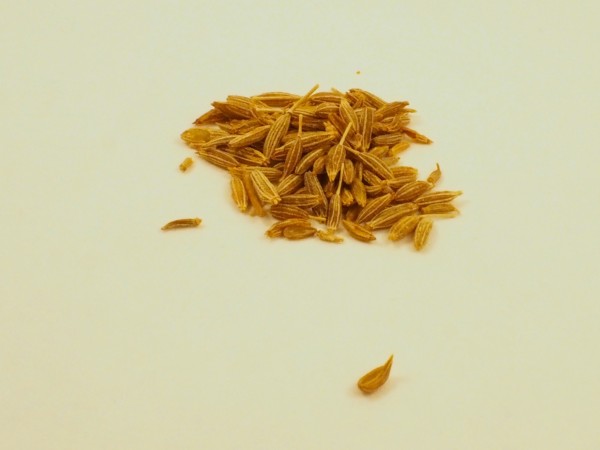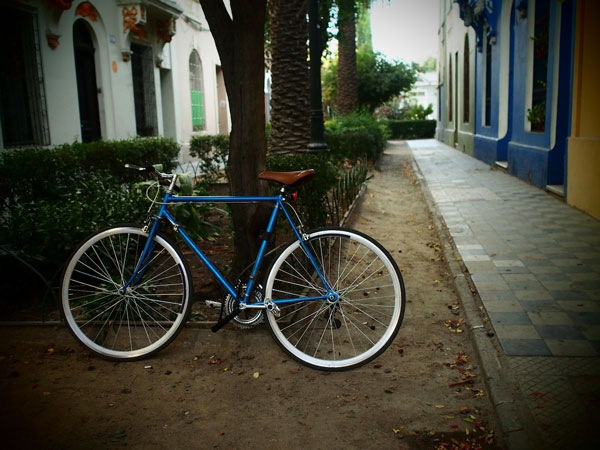Me importa un comino means, literally “it is as important to me as/ I don’t give a cumin seed.” Cumin seeds, as you may well be aware, are quite small.
And yes, I really did set up the light box (made out of materials purchased at Sodimac (like Home Depot) and a local stationary store, and such materials include three table lamps, cardboard and sheer curtain) just to take that picture. Apparently I’m in a no-craft-too-great mode (remind me to tell you about the homemade marmalade and tahini projects, both a raucous success).
Cumin is one of those flavors I might not have associated with Chile, where flavors are mild, and typified by onions (rinsed, so they don’t taste too much) and oregano. Newly, there is interest in the Mapuche spice mix merquén (which I’ve written about, easy enough to find, or look here, but many people aren’t fans of spicy food, or still find it “exotic,” despite it actually being from here and cumin, well, not.
Cumin is from far far away, from the Nile valley even, and is related to fennel, growing in that stalk-and-star combination I love. I don’t know how it got here. It could have come with the Spaniards, or perhaps with the British. One of my long-standing unfulfilled projects is to research this, as well as other influences that have worked their way into the Chilean kitchen, where cumin, despite being quite foreign, is important.
Cumin is important, oh, it is! It is part of “aliño completo,” an herb and spice mix in nearly everyone’s kitchen, and which, according to one of the distributors, is “a mix of the best-known spices and condiments, oregano, garlic, cumin, pepper, cilantro and salt.” They think you should “use it to brighten the flavor of all of your meals.” It’s kind of Chile’s masala, or curry if you will. A pinch of it can show up in porotos granados, in meat, empanadas, etc. I don’t have any in my kitchen because well, I have a ton of cumin seeds, and think they taste great toasted and ground. If there were proprietary mixes of it that someone’s grandmother made, I’d be all about it, but otherwise, I keep my money for myself and not for Marco Polo. Which is of the brands of spices here, because well, he traveled around the world and brought spices. Maybe cumin, even.
So why a cumin seed? Because they’re small. Or because apparently “the Greeks defined as a miser one who counted cumin seeds” (The East India Company Book of Spices by Antony Wild, p 44), though that would indicate that actually they ARE important. Maybe it’s a case where the saying got convoluted, like how “I couldn’t care less” is sometimes mis-said as “I could care less,” which means it is important to you, when that is not what you said.
But I’m guessing we’re going for the size of a single cumin seed, in which case it is insignificant because, see (above), tiny.
And if you are anti-cumin (contra comino! which is very funny because it sounds like you are against roads, which are caminos), then worry not, because there are many other things other than comino that can “importarte” when what you really mean is that the thing is not important to you at all.
To wit:
Me importa (it is as important to me as/ I don’t give a …)
un pucho (a cigarette butt)
un carajo (a damn)
un rábano (a radish)
un pepino (a cucumber)
un bicho (a bug)
un chorizo (a sausage)
una mierda (a crap)
and my personal favorite, un bledo (a small, insignificant thing)
But it turns out that a bledo is a name for amaranth. Although I don’t have any amaranth seeds on hand, trust me when I say that they are extremely tiny, far smaller than all of the above items.
And I suppose it’s possible that this whole discussion is nothing more than a diversion for you, which doesn’t importarte at all. At least now you’ll be equipped to tell me in Spanish, should you run into me on one of my supply-gathering missions.
(There is also “un pito,” and “un coco,” which in these cases are used to refer to the male anatomy, though a pito is actually a joint in Chilean Spanish). I don’t think it’s my place to discuss the relative value or size of these items, plus, you know, PG-13.











I have some amaranth seeds on hand, tiny indeed, had no idea bledo referred to that. I know a few anti-comino people, though I don’t get it. I have heard linguists make a case for both could and couldn’t care less. I like the phrase with “pico” though that is not even pg-13, I usually go with pepino.
Hello Eileen,
I enjoyed a lot your elaboration on the “me importa un comino” expression. Your interpretation is correct. I am not sure that to substitute comino for bicho or chorizo, are equally powerful and meaningful. One equivalent expression, made locally notorius by our only yet short-lived top ranked tennis player, Marcelo Ríos, is “no estoy no ahí”. Deeply existential, it would be like saying “I am not even there”.
I didn’t know the synthesis of “no estoy ni ahí,” but I do enjoy it! Thanks for popping in!
“no estoy ni ahí” is literally “tô nem aí” in Portuguese that is probably the most common and pedestrian expression in Brazil to say you couldn’t care less for something. I love it how latin languages suddenly suprise us with striking similarities.
Yep, totally agree that the similarities between Romance languages are awesome. I enjoy that all the time. I’ve never heard my comadre (my goddaughter’s mother, who is Brazilian) use that expression though. I’ll have to listen more carefully, though she only speaks to the kids in Portuguese, and to everyone else in English or Spanish. Thanks for commenting!
Thank YOU for your kind reply.
It’s common in Brazil indeed. In fact there used to be a chart-topping song in the late 1990s called “Tô nem aí” (https://youtu.be/meAdbab15IA).
Cheers!
I’ll have to give it a listen. I don’t listen to much music in Portuguese, but I should. So now I will. Thanks for the recommendation.